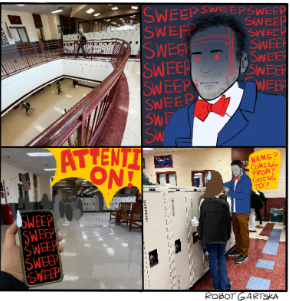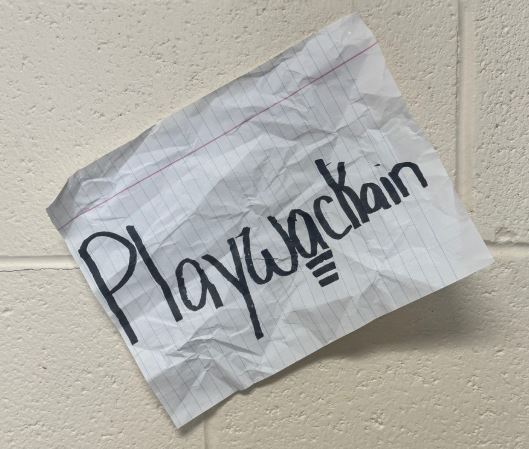You’re running to your classroom, shoulder to shoulder with the hundreds of students swiftly walking alongside you. Exhausted from the seven periods before, you still trudge to your last class, ultimately managing to get to your classroom. But as soon as you reach the door, it slams right in front of you. You’ve been swept.
But what is a sweep? Sweeps happen twice a day for the students at Neshaminy High School (NHS). Only having four minutes to traverse the school between periods, students rush to their classes in order to deter the fate of being penalized for being even a few seconds late.
Repercussions for being swept escalate quickly and have been causing recurring problems for the environment of NHS. After the first warning, students who reach two receive detention. However, students are taking action against these policies they deem unfair.
The Petition
A petition was published on Sept. 8, 2025. Created by senior Abby Kindness and further endorsed by those in the drama and choir departments, this petition has already accumulated 103 signatures as of Oct. 1. Originally aiming for 100 signatures of voices wanting change, this petition has been pushed to 200 signatures in hopes of needed alterations.
Within the petition, Kindness heavily focuses on how these sweeps are detrimental to the environment of learning within NHS. Specifically, Kindness focuses on aspects of accessibility to restroom facilities, punctuality for learning, and overall questions the fairness behind these policies that are supposed to enhance NHS, not make it difficult for students to have a normal school day.
“Sweep passes were introduced to help manage student movement” Kindness states. “[T]hey have turned into a barrier for timely classroom attendance.”
Kindness highlights a popular student perspective on how these sweeps have created the opposite effect intended for the student body. Created for efficiency, sweeps have caused issues concerning many simple aspects of a school day.
No Rest for Restrooms
Kindness then emphasizes the deteriorating conditions of bathrooms within Neshaminy. Prerequisite to the hallway sweeps, only a few bathrooms had been available for students to utilize. With approximately 3,000 students attending NHS, trying to go to the bathroom leads to lines. Because of these conditions, “accessibility is severely limited” Kindness expresses.
It’s not only Kindness that is being affected by these policies. When being asked about whether or not she’s heard complaints from other students, she replied, “especially people who take classes in this hallway [C Hall], the ceramics classes I hear it from.”
She further expands on this issue by pointing out that being in “this corner” (C Hall) of the school causes six minute bathroom trips with the two closest sets of bathrooms being shut down, leading to less time in class.
The Minute Pass and E-Hall Pass
Despite the negative conditions surrounding the bathrooms and sweep policies, there have been attempts to allow students to get to class more efficiently. For students who have classes very distant from each other, they have the ability to apply for a minute pass. If approved, these minute passes allow an early exit from class in order to avoid any repercussions of lateness.
However, these minute passes are not sufficient according to many students. As Kindness points out in her petition, “minute passes disrupt our learning, just to comply with these restrictive policies.”
According to Liora Gutman, NHS sophomore, “The minute passes aren’t a solution either because most teachers teach until the last second.”
While it is understandable for teachers to utilize their time within the classroom, even packing up when the bell rings can cause many students to become late.
Students are also restricted to only three passes a day during class. This doesn’t just include bathrooms, but also visits to other teachers or other necessary whereabouts if the passes haven’t been “scheduled” ahead of time. If students were able to use the restroom in between classes with sufficient time and not having to wait for an open stall, more class time would be available for learning.
Swept Away Stories
A student who wishes to stay anonymous also shares their story concerning an unfair hallway sweep. Coming back from a hike during PE, this student and the rest of their class were let back into the building at the time of a warning bell, indicating that only two minutes were left to get to class. Not being able to find the gym teacher, the student and three others were rushing to their class in upstairs D Hall without a pass. As soon as they reached the hall, the final bell sounded and the sweep came on the announcements.
Despite being so close to their classroom, they had to go to the main hallway of the school and try to explain what had happened. Even with the explanation, the staff member ignored what had happened to the students and still wrote them each a pass, all of which were recorded.
When interviewed, this student stated, “It was completely unfair. Several of my classmates were in that gym class, even more than I was running with to make it to class on time. My teacher had to stand outside the classroom and let in several students, making us waste even more class time.”
This story is just one of many told by those at NHS, indicating their concern for what other rules may be instilled in the future. Some students are late due to late dismissals by teachers, others by large tests and working until the bell, and some just with the simple need of using the bathroom.
Hopes for the Future
But what can be done? As the petition shows, many students are taking action for the removal of sweeps and the change to five minutes between class periods. Implementing these requests would allow the students to focus more on school rather than struggling to go to the bathroom or being met with serious penalties for circumstances they weren’t able to control.
For students this means speaking up and raising awareness so their expectations for a proper learning environment are met. By appeasing the restless students within NHS advocating for change, staff making these decisions could expect a more positive atmosphere, allowing education and students to thrive.






